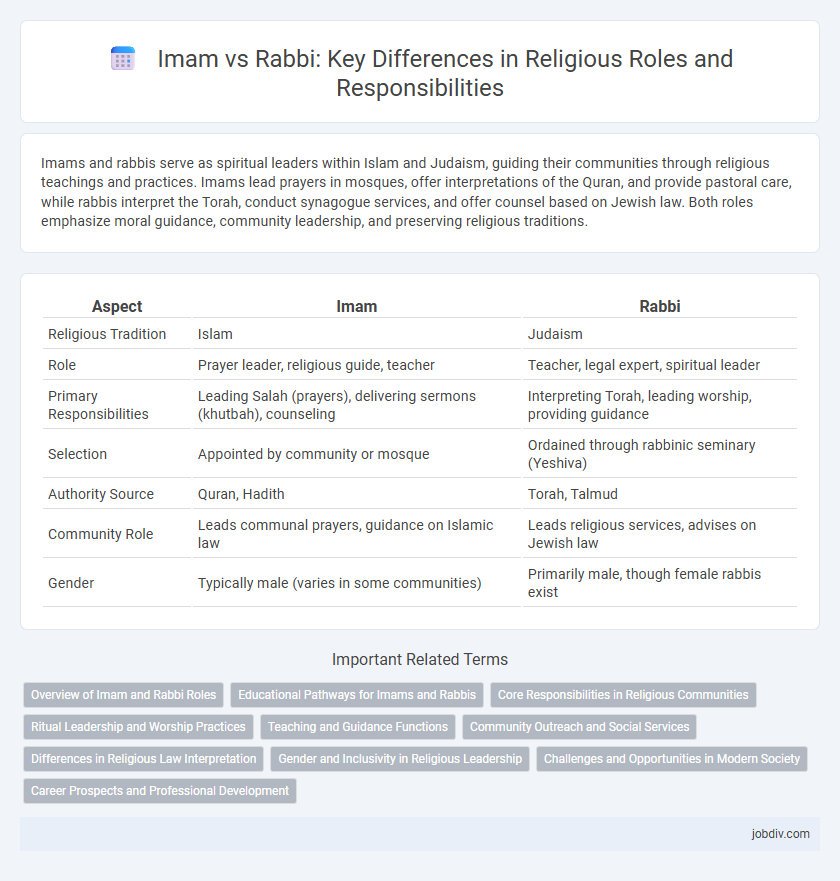Imams and rabbis serve as spiritual leaders within Islam and Judaism, guiding their communities through religious teachings and practices. Imams lead prayers in mosques, offer interpretations of the Quran, and provide pastoral care, while rabbis interpret the Torah, conduct synagogue services, and offer counsel based on Jewish law. Both roles emphasize moral guidance, community leadership, and preserving religious traditions.
Table of Comparison
| Aspect | Imam | Rabbi |
|---|---|---|
| Religious Tradition | Islam | Judaism |
| Role | Prayer leader, religious guide, teacher | Teacher, legal expert, spiritual leader |
| Primary Responsibilities | Leading Salah (prayers), delivering sermons (khutbah), counseling | Interpreting Torah, leading worship, providing guidance |
| Selection | Appointed by community or mosque | Ordained through rabbinic seminary (Yeshiva) |
| Authority Source | Quran, Hadith | Torah, Talmud |
| Community Role | Leads communal prayers, guidance on Islamic law | Leads religious services, advises on Jewish law |
| Gender | Typically male (varies in some communities) | Primarily male, though female rabbis exist |
Overview of Imam and Rabbi Roles
Imams lead Islamic worship, guide congregational prayers, and provide spiritual and educational leadership within Muslim communities. Rabbis serve as Jewish religious teachers, interpreters of Torah law, and leaders who conduct synagogue services and lifecycle events. Both play pivotal roles in fostering religious knowledge, ethical conduct, and community cohesion among their followers.
Educational Pathways for Imams and Rabbis
Imams undergo rigorous study in Islamic jurisprudence, Quranic interpretation, and Arabic language at madrassas or Islamic seminaries, often culminating in an Ijazah or equivalent certification. Rabbis engage in extensive Talmudic scholarship, Jewish law (Halacha), and Hebrew language at yeshivas, leading to semicha ordination. Both paths require deep scriptural knowledge, community leadership training, and continual religious study to fulfill their spiritual and educational roles effectively.
Core Responsibilities in Religious Communities
Imams primarily lead Islamic prayers, deliver sermons (khutbah), and provide spiritual guidance within Muslim communities, emphasizing the teachings of the Quran and Hadith. Rabbis serve Jewish congregations by interpreting Jewish law (Halacha), conducting religious services, and offering counseling based on the Torah and Talmudic tradition. Both roles hold crucial authority in religious education, ritual leadership, and community cohesion but differ according to their respective faith doctrines and liturgical practices.
Ritual Leadership and Worship Practices
Imams serve as ritual leaders in Islamic worship, leading daily prayers, delivering sermons (khutbah), and guiding congregational rituals such as Friday prayers and Ramadan observances. Rabbis function as spiritual leaders in Judaism, conducting worship services, offering Torah interpretations, and overseeing rituals like Sabbath services and lifecycle ceremonies. Both roles emphasize religious education and community guidance but differ in liturgical practices specific to Islamic and Jewish traditions.
Teaching and Guidance Functions
Imams and Rabbis both serve as spiritual leaders, providing religious teaching and guidance within their communities. Imams primarily focus on interpreting Islamic teachings, leading prayers, and offering counsel based on the Quran and Hadith. Rabbis specialize in Jewish law, Torah study, and ethical guidance, facilitating religious education and community decision-making.
Community Outreach and Social Services
Imams lead Muslim community outreach programs that focus on providing educational workshops, charity drives, and interfaith dialogue to promote social cohesion and support vulnerable populations. Rabbis oversee Jewish community centers that offer social services such as food banks, counseling, and youth mentorship, reinforcing communal bonds and addressing local needs. Both religious leaders play crucial roles in mobilizing volunteers and resources to enhance social welfare and foster inclusive, resilient communities.
Differences in Religious Law Interpretation
Imams interpret Islamic law primarily based on the Quran, Hadith, and Sharia principles, emphasizing jurisprudence (fiqh) derived from these sources. Rabbis base their legal decisions on the Torah, Talmud, and Halakha, focusing on rabbinic interpretations and oral traditions accumulated over centuries. This difference results in distinct approaches to religious law, where Imams often prioritize divine revelation and prophetic teachings, while Rabbis emphasize rabbinic scholarship and communal customs.
Gender and Inclusivity in Religious Leadership
Imam and Rabbi roles reflect distinct gender and inclusivity dynamics within Islamic and Jewish religious leadership. While many Muslim communities traditionally restrict the role of Imam to men, some progressive Muslim groups increasingly support female imams to foster gender inclusivity. In contrast, numerous Jewish denominations, including Reform, Conservative, and Reconstructionist movements, embrace both male and female rabbis, promoting broader inclusivity and gender equality in religious leadership.
Challenges and Opportunities in Modern Society
Imams and Rabbis face unique challenges in modern society, including addressing secularism and interfaith dialogue while maintaining religious traditions. Opportunities arise through leveraging digital platforms to engage younger generations and fostering community cohesion across diverse cultural contexts. Both leaders play pivotal roles in promoting tolerance and social justice amid evolving societal values.
Career Prospects and Professional Development
Imams and Rabbis both serve as religious leaders but differ significantly in career paths and professional development opportunities. Imams often pursue roles in mosques, Islamic centers, and educational institutions, with advanced studies in Islamic jurisprudence and theology enhancing their prospects. Rabbis typically engage in synagogue leadership, counseling, and teaching, with career advancement linked to rabbinical ordination and continued study in Jewish law and ethics.
Imam vs Rabbi Infographic

 jobdiv.com
jobdiv.com